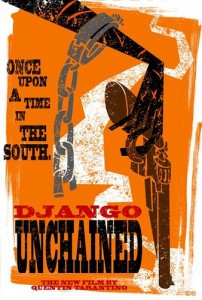Chinese censors abruptly pulled the Oscar-winning film “Django Unchained [1]” from the country’s theaters on its premiere day in an unexpected about-face after the film's week-long promotion [2]in China.
The move was so hasty that one Beijing cinema reportedly [3] saw the film come to a halt one minute into its screening on April 11, 2013, and audiences were offered ticket refunds. The film's importer, the China Film Group Corporation [4], cited “technical problems” it has yet to specify.
Censorship of the Chinese film industry is not unusual. China’s State Administration of Radio Film and Television [5] revealed in a 2006 regulation [6]that it would ban films that “promote obscenity and violence” and as a result, footage containing “adult content” would be cut out before they are screened in theaters.
American director Quentin Tarantino [7]‘s “Django Unchained [1]“, which tells the story of a freed slave who travels across the United States to rescue his wife from a plantation owner, has faced criticism [8] for its frequent use of graphic violence. The film, which was released December 25, 2012 and stars Leonardo DiCaprio, Jamie Foxx, and Christoph Waltz, was well received overseas, earning 256 million US dollars [9] outside the United States.
So the disappearance of “Django Unchained” seemed in line with the country's censorship standards, with the film's nudity and flagrant violence suspected as the reasoning behind the suspension. What baffled observers, however, was that even though its content was edited beforehand, including deleting blood splattering scenes and changing the color of the blood, the film was still removed,according to Chinese media reports [10].
The suspension and a likely pending ban of this much anticipated film obviously came as a disappointment for many Chinese moviegoers.
Xue Yidao [11] [zh] from Beijing lamented on the most popular Chinese microblogging site Sina Weibo:

Poster for Django Unchained. Image by Flickr user @Film_Poster(CC BY-SA 2.0).
在三里屯美嘉看第一场《姜戈》,刚看了1分钟,停了!!工作人员进来说广电总菊和院线都来电话说要推迟!!谁能告诉我这他妈是什么情况!!!
I was watching the premiere of “Django Unchained” at MegaBox in Sanlitun, after one minute, it was stopped!! Cinema staff walked in saying the the State Administration of Radio Film and Television and other cinemas called to order a suspension of the movie !! Can anyone tell me what the hell is going on!!!
Zhou Liming, a prominent Chinese movie critic, he offered [12]his terse condolences on Weibo:
Django Chained Again
Global Times newspaper editor-in-chief, Hu Xijin, also weighed in [13] [zh]:
<被解救的姜戈>突然紧急暂时停映,这个行动本身对国家政治带来的损害,要远远大于一旦没把“有害 镜头”剪干净有可能带来的损害。现在体制内缺少在一些敏感节点上敢于对上请述真情、并以此避免决策不当的人。或者是体制的确不鼓励这样做。一些奇怪决定在 各地和部门频出,最后埋单的都是政府公信力。
The sudden suspension of “Django Chained”, the harm that this action itself brings to politics far exceeds the harm that would have been caused by not censoring the offensive scene. We now lack people within the system who dare report the truth to leaders on some sensitive issues so that misjudgment could be avoided. Or perhaps the system does not encourage doing so. Some odd decisions so often emerge from different places and different ministries, what will be at stake in the end is the government's credibility.
Chinese censors in the past few years have put a stop to films that carry political overtones. In one example, Chinese director Lou Ye [14]was banned from making films in China for five years after his “Summer Palace [15]“, which supposedly upset authorities with its setting against the backdrop of the 1989 Tiananmen student movement [16], premiered at the Cannes International Film Festival in 2006.
A netizen named Fenng indicated [17] [zh] on his Weibo that the freedom promoted in “Django Unchained” might be the reason behind the suspension:
关于电影《被解放的姜戈》 ,估计在某些人眼里,这片子宣扬了姜戈作为奴隶的反抗意识和觉醒,一直被奴隶主奴役和压迫,突然手里有了枪,为了自由和爱情而反抗。这他妈多危险啊。
The movie “Django Unchained”, perhaps in some people's eyes, this movie promotes Django's awareness to protest as a slave, a long suppressed slave suddenly has a gun, he fights for love and freedom. How freaking dangerous that is.
In response to his message, “Johnny Zhang 86″ from China's central province Henan wrote [18] [zh]:
广电干脆规定只准只进口朝鲜的电影~
Why doesn't the State Administration of Radio Film and Television mandate that we only import films from North Korea~
Jiazhuang Zai Niuyue also challenged [19] [zh] the suspension of the movie:
为什么出现长时间裸女镜头的抗日神剧能在电视黄金时段播放,而「被解放的姜戈」只有短短几秒钟的男性生殖器镜头却不能在电影院放?为什么编造历史纯属意淫的抗日神剧能放,讲不愿做奴隶的姜戈杀死奴隶主的电影却不能放?
Why the anti-Japanese TV dramas can be aired in primetime with footage of nude women, but “Django Unchained” was not allowed to be screened in theaters with only seconds of male genitals? Why can the anti-Japanese TV dramas with fabricated content be aired whereas a film telling the story of a slave killing his owner to get rid of slavery can't be played?